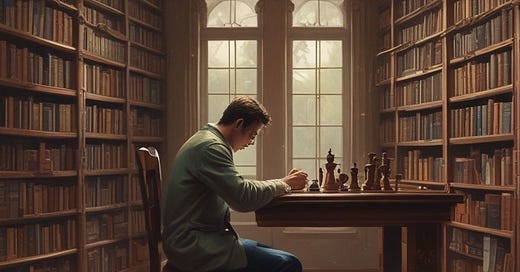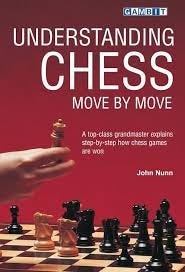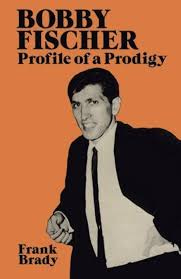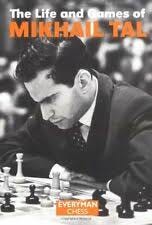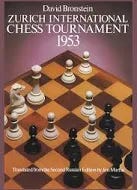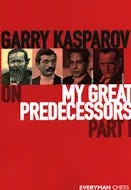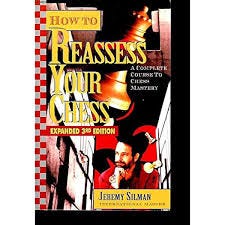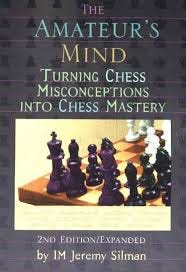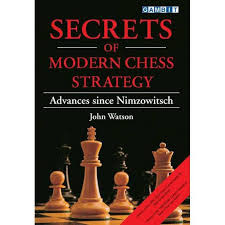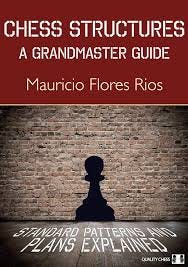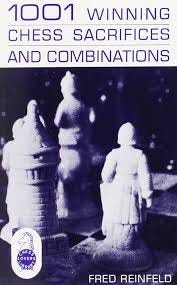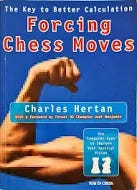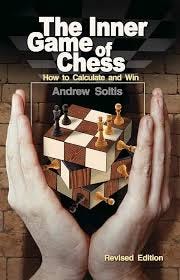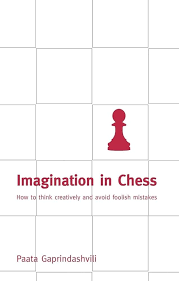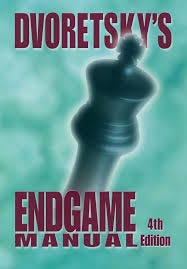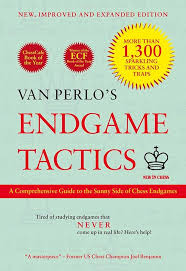Do you enjoy chess? Are you an ambitious adult improver? Become a subscriber to Chess Chatter for free to receive weekly podcast updates, challenging puzzles and insightful articles that will help you improve.
Recently I was talking with a friend during a training session and we got on the topic of which books we had read as we were growing up and working towards the master title. This particular training partner is 50 years old so he had read many different books when he was younger that I hadn’t come across. Despite that, we had some shared reading history too. It was interesting to discuss which books he had read, which ones I had read and which books overlapped for both of us.
That discussion had me reflecting on my chess journey from when I started at the age of 10 until I first reached USCF National Master at 18 years old. As I mentioned around 11 minutes into a recent Chess Journeys podcast episode, I was a voracious reader of chess books when I was younger and feel that books shaped a big part of my chess knowledge.
In this post I wanted to talk about the 15 most influential books I read before becoming a master. Note that this is a personal list and just because a book isn’t on this list doesn’t mean that I don’t think it is good or worth reading. Also, I have read many more than the 15 books on this list but didn’t want the list to become way too long :-)
The following books are grouped into four categories: game collections, positional, tactical and endgames. Within each of the categories I will be ordering the books according to which one I read first, second, third, etc. There will be no “opening” category since I really didn’t read any opening books before I hit master. My openings back then were pretty much developed from just playing a lot of games, trying new things out and then analyzing the games afterwards. I will also mention a suggested rating level for each book.
Final note: Due to the length of this post, it may cut off somewhere if you’re reading it in your email. You may need to click on “View entire message” to see the full post if that happens. Also, the following links will give me a small commission if you make a purchase. I appreciate the support!
GAME COLLECTIONS:
“Understanding Chess Move by Move” by John Nunn
I remember this book doing a great job of explaining all of the moves and ideas behind the games featured in the book. The 30 games in the book are split into “opening themes” (games 1-5), “middlegame attacking play” (games 6-11), “middlegame defensive play” (games 12-15), “middlegame positional play” (games 16-27) and “endgame themes” (games 28-30). The book doesn’t pull any punches and can get pretty in-depth at times but being able to see a lot of games and learn important ideas and themes from each of them was very enlightening.
An unfortunate memory: I lost my physical copy of this book during a road trip as a kid. I’m pretty sure that the book fell out of the car when the door was open at one point :-(
Rating level: Intermediate-plus
“Bobby Fischer: Profile of a Prodigy” by Frank Brady
Somehow I found this book in my middle school library of all places. I remember reading it from cover to cover and being awed at the way that Fischer played chess. The book is part biography and part game collection. Many stories are told about Bobby Fischer but you also get a lot of analysis of the games he played up until he became World Champion in 1972. If I remember correctly, the book ends around there so you don’t get much about his disappearance and quitting chess afterwards but I remember it being a great read full of insightful stories and games.
Rating level: Intermediate-plus (or you can just read the stories which are interesting!)
“Life and Games of Mikhail Tal” by Mikhail Tal
This is one of my favorite books of all time due to the fantastic stories and love for the game that jumps off the pages. This is an auto-biography that is written in the style of an interview between an unnamed interviewer and Mikahil Tal. The games are magical with all of the tactics, attacks, sacrifices and such that Tal is well-known for. You really get to know the man behind the crazy sacrifices very well as you read the book.
Rating level: Intermediate-plus (or you can just read the stories which are interesting!)
“Zurich International Chess Tournament, 1953” by David Bronstein
Great collection featuring 210 games played during 28 rounds between the strongest players in the world at the time including Smyslov, Bronstein, Reshevsky, Keres, Petrosian, Najdorf, Geller and more. Every game is thoroughly annotated and explained. You could spend a very long time going through this book and still possibly not get through all 210 games. Highly recommended. It will keep you busy!
Rating level: Intermediate-plus
“My Great Predecessors” (series) by Garry Kasparov
This is a 5-part series of books that shows games from all the world champions prior to Garry Kasparov becoming the 13th world champion. There’s also games of players who weren’t world champions but were at the top-level of chess in their heyday. Very tough series of books since Kasparov gives very in-depth analysis of the games but if you ever want a comprehensive analysis of the first twelve world champions then you can’t get better than this.
Rating level: Advanced/expert
POSITIONAL:
“How to Reassess Your Chess” by Jeremy Silman
This book set the tone for my playstyle which has lasted all the way to today. This is the book that really got me to understand positional/strategic chess in the first place and has influenced me to become the positional-oriented player that currently am. Silman focuses heavily on the seven different imbalances in chess. Sometime in the past I heard them turned into the acronym IMPLODeS which stands for initiative, material, pawn structure, lines, officers (bishops and knights), development and space.
Each imbalance is explained in-depth and you get a good understanding of how to make plans revolving around each imbalance whether you or your opponent have an imbalance in your favor. I think this book is one of the most popular and highly recommended books throughout all of chess literature and I feel that it’s for a good reason!
Rating level: All
“The Amateur’s Mind” by Jeremy Silman
Another great book by Jeremy Silman. There are some similarities between this one and “Reassess Your Chess” but also some big differences. There is a focus on positional play in both books but this specific one focuses heavily on surveying a wide range of players and seeing what they think about each position.
For each position you’ll get to read the thoughts of players ranging from under 1000 to over 2000 and see their analysis. This was invaluable to me when I was young since I really liked to compare my thinking process with the players in the book. Of course I was trying to think about the position like Silman did but if I didn’t think the same as him, was I at least close to one of the strong players he surveyed? I liked this kind of approach to the book and enjoyed it a lot.
Rating level: All
“Secrets of Modern Chess Strategy” by John Watson
Looking back on my journey, this is the first book on the list that I probably read too early and didn’t get enough out of it on my first go-through. That being said, this book really does a great job of showing the flaws and breaking the “principled” way of thinking while going against the grain. There is a big focus on how old pre-conceived ideas changed over time and how the newer, more modern way of thinking revolutionized things and refined traditional theory.
This book was written in 1999 before engines really took over and it’s interesting to see the change in “human” thinking before the silicon monsters came along and changed the way we thought about chess again (for example, read the fantastic “Game Changer” book). It’s a deeper book but a good one. Probably best for slightly more advanced players.
Rating level: Advanced-plus
“Chess Structures: A Grandmaster Guide” by Mauricio Flores Rios
Another one of my favorite books of all time. I have recommended this book to countless students over the years. Each pawn structure in this book is explained in great detail, the plans for both White and Black are detailed and many model games are included. No matter what opening you play, you will probably find a pawn structure in this book (or multiple pawn structures!) that you come across on a regular basis. This book will help you to understand those pawn structures and improve your opening and middlegame play a ton. Highly recommended!
Rating level: Intermediate-plus
TACTICAL:
“1001 Winning Chess Sacrifices and Combinations” by Fred Reinfeld
I remember going through this book so many times that the pages were falling out of my physical copy! Each chapter focuses on a specific tactical theme (pin, fork, skewer, double attack, etc.) and there are tons of puzzles where you have to execute the theme in many different ways. It’s a relatively straightforward “show-don’t-tell” book that focuses on the puzzles and their answers with no fluff. If you simply want to practice a lot of puzzles then this is a good book.
Rating level: All
“Forcing Chess Moves” by Charles Hertan
This was my first “calculation” book. Different from a “tactic” book, the puzzles in this book are deeper and more complex. A big focus is on “computer eyes” and trying to improve your candidate move search plus calculation. The book is difficult but rewarding and definitely helped me to become better at calculating in my own games.
Rating level: Advanced-plus
“The Inner Game of Chess” by Andrew Soltis
Another fantastic calculation book. This one is much more focused on “how” to calculate compared to the previous book in the list. Topics covered include candidate moves, the tree of analysis, the importance of force, figuring out when to end your calculation and how to assess positions after you stop calculating, calculation pitfalls and much more. I don’t remember the positions being overly difficult but the explanation on how to calculate properly and accurately was invaluable.
Rating level: Intermediate-plus
“Imagination in Chess” by Paata Gaprindashvili
This is a tough puzzle book but an absolute gem. Each of the puzzles in this book require you to think backwards and reverse engineer ideas. Sometimes a certain tactic will be very close to working and you have to figure out how to work around the opponent’s defense by changing your move order. Plenty of puzzles involve some kind of creative solution which is always rewarding to figure out. Every strong player I’ve talked to and has read this book has recommended it. This was one of the books that my training partner and I had both read as well.
Rating level: Advanced-plus
ENDGAMES:
“Dvoretsky’s Endgame Manual” by Mark Dvoretsky
Somehow this was the first real endgame book that I remember reading and it is one that I probably read a bit too early in my chess improvement. That being said, it’s a terrific book. If you are at an intermediate level I would recommend focusing on just the blue text which covers the most important endgames to know. If you’re more advanced then you can go through the whole book. If you want a pre-cursor to this book though then I would probably recommend “Silman’s Complete Endgame Course” before getting in Dvoretsky’s book, though I hadn’t gone through that book myself prior to this.
Rating level: Intermediate (if you focus on the blue “fundamental” text) or advanced (if you go through the whole book)
“Van Perlo’s Endgame Tactics” by Ger Van Perlo
The final book on the list is a book with a good mixture between tactics and endgames. Probably this one could have been grouped with the “tactical” books but since it is purely endgame positions I felt like I’d keep it here. If you want to stretch your calculation muscles then this book is a must, but you will probably want to have a good background in endgame understanding to be able to calculate the positions well in the first place. All that being said, it’s a great book!
Rating level: Advanced-plus
BONUS:
Chessmaster 9000 (computer program)
You might be thinking “Isn’t this a post about books? What’s a computer program doing in here?” but I couldn’t resist throwing this in here at the end.
Yes, it’s not a book but this chess program (released in 2002) was actually a big part of my improvement as well. This computer game included many good training tools including a downloadable endgame database generator, “follow the game” training, “memorize the position” training, a “blunder alert” feature, an endgame quiz authored by Grandmaster Larry Evans and my favorite feature which was many courses written and recorded by International Master Josh Waitzkin (the movie “Searching for Bobby Fischer” was based on his early life and he wrote the famous book “The Art of Learning”).
I remember going through EVERYTHING in this chess program and becoming stronger very quickly due to it. I can’t credit the books listed above without also mentioning this.
Rating level: All
And that’s it! Hope you’ve enjoyed the list :-) If you’ve read any of these books yourself or have any other book recommendations then I’d love to hear them in the comments below.
See you in the next post!

